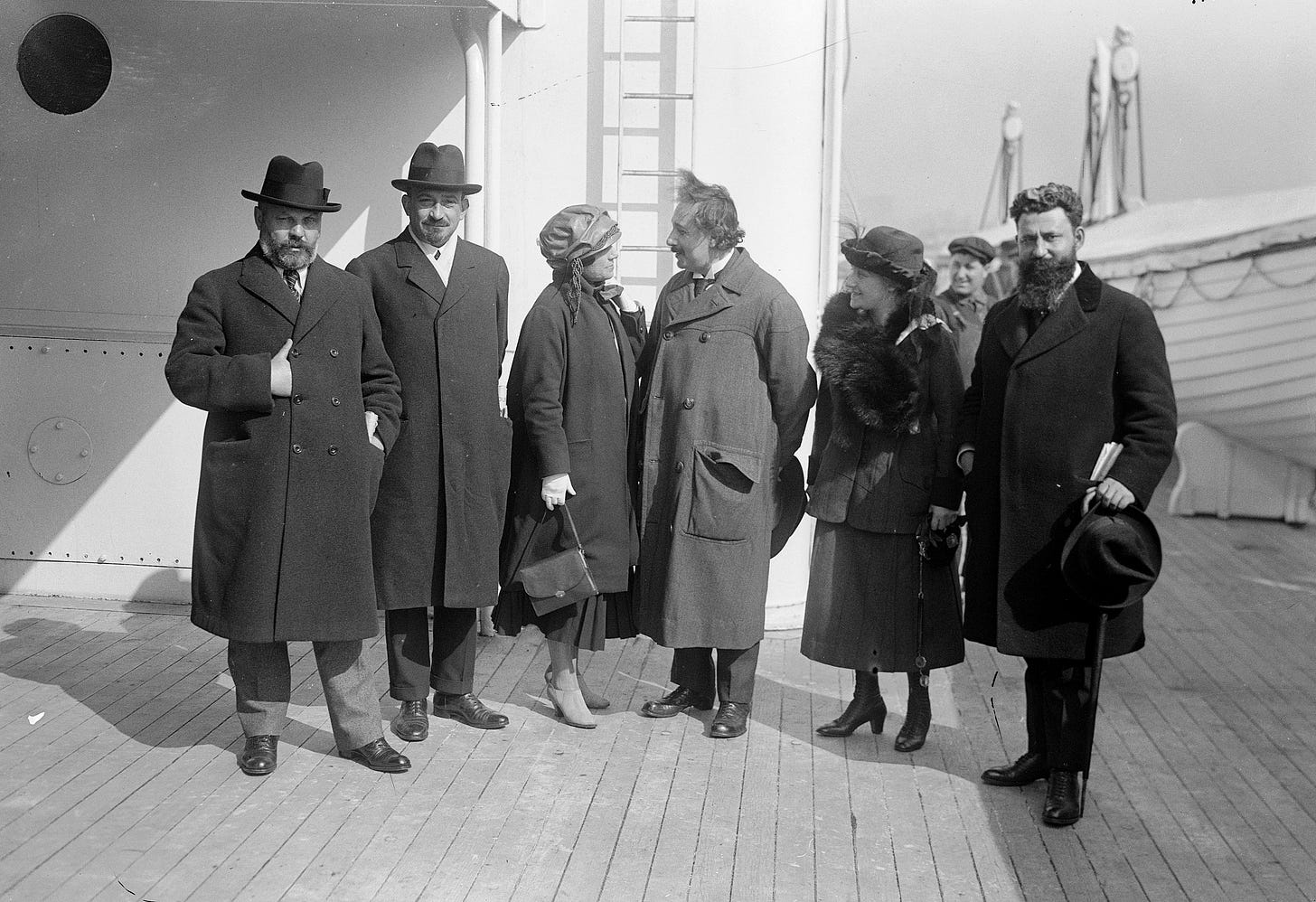Musings: Einstein & Zionism
Takeaway? Einstein was pretty clear that a Jewish ethnostate was bad—and that it would be poisonous.
[Note: So I disappeared for a month (oops)—my bad. Look, I’m not a journalist. As I’ve said before, I do this for free when I have something to say, and so sometimes I will disappear into the ether for a while to deal with my real life. Or because the world is awful and I need a break. Regardless, I have something to say, and so here I am.]
This may seem like it’s coming out of left field, but I want to talk about Dr. Albert Einstein. Yep, I returned to talk about Einstein of all people.
Well, actually, what I want to talk about is Einstein’s thoughts on something that is not math or physics. Something Einstein-adjacent, if you will. You see, I read a comment on a post that spurred a Wikipedia rabbit hole adventure for myself, and I have come to quickly discuss what I learned about the complicated genius.
As I’m sure everyone is well aware, Einstein was not only German but Jewish. While Einstein considered himself agnostic, he was ethnically an Ashkenazi Jew, and as such, was persecuted by Nazis. He was already an established genius by the time the Third Reich began, having published the Theory of General Relativity more than a decade prior, but Nazi persecution was what led him to the United States, where he worked on the Manhattan Project—the development of the first nuclear weapons, something that Einstein only supported because Nazi Germany was also trying to develop nuclear weapons.
Nuclear weapons have made absolutely everything worse, but I can’t imagine putting myself in his shoes and not making the same decision. I have to be honest about that.
This is all to say that I respect Einstein as a scientific mind. Someone who changed the world fundamentally. I always have. However, I have never thought about his opinions on Zionism until today—why would I have? I’m not one to assume the stances of Jewish historical figures on Israel. Yet Einstein lived through World War II, the Nakba, and the founding of Israel. Guess what? Einstein called himself a Zionist but refused to call himself a nationalist. In fact, he was adamantly against nationalism, which makes for a very interesting ideology.

So if Einstein considered himself a Zionist, but opposed Jewish nationalism, what did he actually believe in? Curiously enough, what Einstein wanted for Palestine and Jews was actually…well, something doesn’t sound all that different from what Palestine was. Einstein wanted a Jewish homeland in Palestine, but he opposed a Jewish ethnostate.
“I should much rather see reasonable agreement with the Arabs on the basis of living together in peace than the creation of a Jewish state. My awareness of the essential nature of Judaism resists the idea of a Jewish state with borders, an army, and a measure of temporal power, no matter how modest. I am afraid of the inner damage Judaism will sustain—especially from the development of a narrow nationalism within our own ranks, against which we have already had to fight strongly, even without a Jewish state…If external necessity should after all compel us to assume this burden, let us bear it with tact and patience.”
—Albert Einstein, Our Debt to Zionism (1938)
That’s one hell of a prediction. One I don’t think Einstein quite understood would come to pass. As we approach the first anniversary of October 7th, as we reach a full year of ramped-up genocide in Gaza, and as Israel’s war crimes expand further into Lebanon, this speech hits especially hard. Eighty-six years after Einstein delivered Our Debt to Zionism, we are witnessing the true effects of the “inner damage” sustained by Israeli Jews. The chilling acceptance of fascistic beliefs in a nationalistic society, not entirely unlike that of ordinary Germans during the Third Reich.
Of course, Einstein’s views were not perfect. I won’t pretend they are (and Einstein had several other issues not related to Zionism). However, I think it’s in his original vision that we’re going to have to find the ultimate answer for what Palestine’s future looks like. Unfortunately, with how the last 80 years have gone, there are more hurdles to achieving this vision. One of which is trust.
To me, it’s clear that the only durable solution is a one-state solution. A two-state solution does not address the real problem at hand: Ethnostates are bad, no matter who does them. You cannot solve this problem by instating a fragmented Palestinian ethnostate in the West Bank and Gaza and allowing Israel to remain a Jewish ethnostate. The problem was never the presence of Jewish peoples or Judaism in Palestine or the region more broadly. The problem was always the ethnic cleansing, and it’s ridiculous to suggest otherwise. There can only be one state—an ethnically and religiously diverse Palestine, just like Palestine was before Zionism. One where everyone may live.




